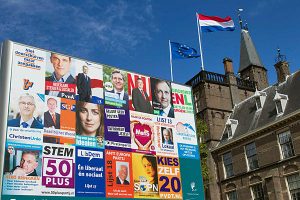Dutch elections: a test for nationalism and the EU
Employment and Social Affairs 13 March 2017The elections in the Netherlands on 15th of March are significant, also being the first of a series of crucial votes in Europe. The outcome of the elections in this country, of approximately 17 million people, could serve as a trailbrazer to understand the trend affecting EU as a whole: in May there will be presidential elections in France, parliamentary elections will take place in Germany this September and in Czech Republic in October. Thus four decisive country of the EU could face significant changes in their political leadership in this delicate period in which Europe is trying to relaunch the integration project, also in view of the 60th Anniversary of the Treaties of Rome. The EU fears that March 15 Dutch election could give a boost to anti-establishment populist parties across the continent.
According to some recent polls, the two governing parties taking part in the Dutch parliamentary elections on March 15 will be punished also for their austerity policies. Anti-EU Geert Wilders’ populist Party for Freedom (Pvv) could emerge as the country’s largest party, although it is thought unlikely to enter a new government in The Hague. In Dutch parliament there are 150 MPs and no single party ever manages to get the 76 seats majority alone, without forming a coalition. Netherland politics have been marked in recent years by a decline in support for the three main parties of government and an growing number of political parties in parliament. This fragmentation of the vote could see the PVV become the largest party, although not forming a government also due to the fact that his anti-islam and anti-immigration rethoric has driven away potential partners among mainstream parties. The VVD party of pro-Eu outgoing prime minister Mark Rutte, and its coalition partner, the centre-left Labour party (PvdA), risk to loose a decisive part of the votes, and probably will not be able to renew the same coalition of government formed in 2010. Thus it seem that there will be a lot of space also for others medium sized party, but not necessarily just populistic party.
As regard the main themes debated during the campaign that seems to be decisive for the outcome of next elections, immigration and EU integration are the main issue together with a wider concept of social state in the Netherland and employment. On this last point Dutch outgoing government recorded positive trends in the latest months: unemployment is at a five-year low and economic growth is at 2.3%. “The economy is up, unemployment is down and some Dutch prisons are so empty the government has been renting out cells”, wrote recently the US press wondering why in the Netherland there is discontent with the outgoing coalition and a there is a threat of Wilders’s party winning the next election.
Despite a kind of simplistic picture of Dutch social situation, it seems true that Pvv appeal is to be found in Wilders’ one-page election manifesto: “us-against-them” , referring to a de-islamization of the country and a strong nationalistic anti-EU rethoric. Furthermore as regard economy, Wilders said that its priorities would be to ”lower income tax” and cut health care contributions, while spending “much more on defense and security”. Thus it seems that Dutch 15th March elections will be a wider test to evaluate which is the level of nationalistic sentiment in the European society. Whatever the outcome will be, it will set the stage for key elections across Europe this year, starting with the first round of the French presidential election on 23 April. And here the game at stake for the EU is even bigger.

www.wordpress.com


